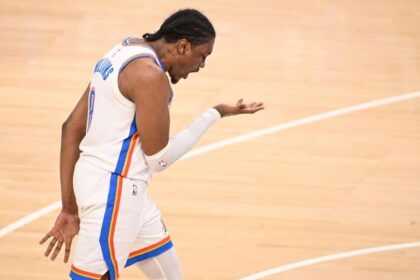Virgil Van Dijk has been recognized as the world’s best center-back in the latest FC 100 rankings, marking his impressive performance at the age of 33. What sets him apart, and how has the Liverpool defender maintained his elite status?
This season has showcased an exceptional group of Dutch players, with Van Dijk asserting his dominance at the core of Liverpool’s defense.
Reportedly translated and enhanced by Jeroen Adriaanse from the Netherlands for ESPN
His record transfer from Southampton in January 2018 made him one of the key figures at Anfield and the most expensive defender globally. Jurgen Klopp emphasized Van Dijk’s significance by appointing him team captain for the 2023-24 season after Jordan Henderson’s departure to Saudi Arabia. New manager Arne Slot recognized no need to change this leadership role in the following season.
“I don’t work with many players who have his leadership qualities,” Slot remarked about Van Dijk. “His energy during every training session is remarkable not just in terms of professionalism, but also in how he influences his teammates, particularly the younger players. Ryan Gravenberch is a prime example.”
“Van Dijk has made a tremendous impact at this club.”
After a period of struggles with injuries, including a significant collision with Everton’s goalkeeper Jordan Pickford that led to a year-long recovery from an ACL injury, Van Dijk has moved beyond fitness issues. While he faced criticism during his comeback for some average performances, he has silenced doubters over the last two seasons. Van Dijk remains the premier center-back in the sport and has recently signed a new two-year contract with Liverpool, indicating his ongoing determination to retain that status.
His Expectations Drive Him
Watching Van Dijk command Liverpool’s defense is consistently impressive. Positioned on the left side of the central defense, he orchestrates play, ensures the team’s shape remains intact, and swiftly corrects teammates when needed.
Even in moments of attack, Van Dijk is already strategizing defensively, preparing for potential counterattacks during transitions. This proactive mindset shapes his defensive tactics; he avoids reckless tackles and effortlessly navigates defending in open spaces. By recognizing threats early and positioning himself accordingly, he remains elusive even at the highest level of competition.
His physical attributes are equally impressive, demonstrating why he continues to excel. Despite past injuries, he retains his explosiveness and agility, making him a formidable challenge for opponents.
Last season, only Everton’s James Tarkowski achieved a higher success percentage in aerial duels (74.6%) than Van Dijk’s 72.1%. On the ground, only one player in the Premier League had a better success rate than the Liverpool captain.
Key in Building Play
The tactical transition from Klopp’s to Slot’s coaching style hasn’t unsettled Van Dijk.
“If you can find someone in goal, do that; otherwise, hold the ball,” Slot explained. “Under Klopp, we often rushed forward, which left us exposed. I emphasize the need to balance risk with reward.”
This more measured approach is well-suited to Van Dijk’s playing style, though Slot asserts that his captain’s value lies in his contributions on the ball as well. “While he’s received accolades for years for his defending, I focus on his build-up play,” Slot noted. “His diagonal passes, through balls, and ability to build from the back are exceptional.”
The data supports this. Van Dijk recorded the Premier League’s highest passing accuracy (91.7%) last season, with many of his passes contributing significantly to attacking play. Most notably, the majority of his forward passes reached the final third. ESPN’s Dutch analyst Kees Kwakman, who played alongside Van Dijk at Groningen and is one of the FC 100 voters, observed, “He’s really excelled this season. His range of passing is impressive, and Slot’s focus on that facet of his game has revealed his true quality.”
Calm under pressure, Van Dijk maintains composure even when Liverpool is heavily pressed in crucial matches. His ability to create movement and passing opportunities has greatly benefited midfielders like Alexis Mac Allister, Dominik Szoboszlai, and Ryan Gravenberch, all recognized in this year’s FC 100, showcasing his vision and willingness to attempt standout plays.
At 33, Van Dijk continues to defy expectations, proving indispensable to Liverpool in his current form.
Fan Take: Van Dijk’s continued excellence is a reminder of the impact a top defender can have on a team, resonating with fans who appreciate tactical skill and leadership on the pitch. His performance not only elevates Liverpool but also sets a high standard for future defenders in the sport.



